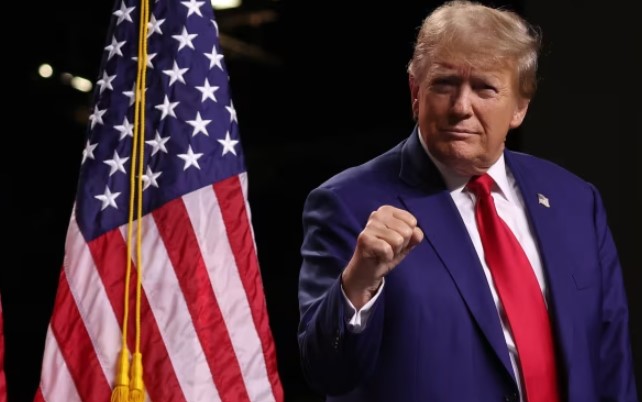
Trump’s Alleged Capitol Riot Connection: A Threat to His Political Eligibility in 16 States?
Trump’s Alleged Capitol Riot Connection: A Threat to His Political Eligibility in 16 States?
Legal Battles Across the Nation Cast Doubt on Trump’s Candidacy for Public Office, The recent decision by the Colorado Supreme Court to disqualify Donald Trump from seeking future office marks the initial victory in a complex legal narrative unfolding across multiple states. Grounded in the assertion that Trump’s involvement in the Capitol riot of January 6, 2021, amounts to insurrection, the challenges under the 14th Amendment have gained momentum.
Lawfare’s comprehensive database documents legal disputes challenging Trump’s eligibility in 16 states, probing whether his actions align with the 14th Amendment and raising significant doubts about his fitness for public office. In state courts, legal battles are underway in Michigan, Oregon, New Jersey, and Wisconsin, underscoring the localized consequences of Trump’s alleged connection to the Capitol riot.
The scope of legal scrutiny extends to federal district courts, with ongoing challenges in Alaska, Arizona, Nevada, New York, New Mexico, South Carolina, Texas, Vermont, Virginia, West Virginia, and Wyoming. Although initial dismissals were experienced in Arizona and Michigan, appeals are pending, sustaining the legal process as efforts persist to contest Trump’s eligibility.
In Maine, challenges to Trump’s ballot eligibility are undergoing review by the secretary of state, and potential appeals may escalate the matter to the state’s Superior Court. The nationwide legal landscape paints a complex picture as the controversies surrounding Trump’s candidacy continue to evolve.
Trump Set to Challenge Colorado’s Decision
In response to Colorado’s ruling, Trump’s campaign is gearing up for an appeal, leading the state Supreme Court to postpone enforcement until January 4. The possibility of the U.S. Supreme Court taking up this appeal introduces the potential for a temporary lifting of Colorado’s hold, allowing Trump to maintain eligibility until a final decision is rendered.
An appeal to the U.S. Supreme Court holds the prospect of placing a nationwide pause on proceedings in all states. J. Michael Luttig, a retired appeals court judge, underscores the potential magnitude of a Supreme Court decision, emphasizing its profound impact.
Initiated by John Anthony Castro, a Republican presidential candidate, nine federal cases challenging Trump’s eligibility have been filed. Despite the Supreme Court’s rejection of Castro’s challenge, his efforts have triggered legal actions in multiple states.
Supreme Court Faces Time Crunch Amid Political Calendar
The looming January 5 certification deadline for Colorado’s primary election intensifies the time pressure on the Supreme Court. The Court’s forthcoming decision holds sway over Trump’s ballot eligibility, casting a shadow on the Super Tuesday primaries across several states.
States like Virginia, Texas, Vermont, and Alaska are on the brink of Super Tuesday primaries, intensifying the urgency of the situation. The outcome of ongoing legal battles and pending decisions stands to shape the landscape of these pivotal primary elections.
Adding to the time-sensitive dynamic is the federal deadline for mailing absentee ballots. The deadline of January 10 for South Carolina accentuates the significance of legal proceedings in that state, intertwining with the broader narrative of challenges to Trump’s eligibility for the ballot.

The intersection of legal proceedings and the political calendar sets the stage for a high-stakes showdown. As the Supreme Court grapples with time constraints, the January 5 certification deadline in Colorado looms large, injecting a sense of urgency into the proceedings. The implications of the Court’s decision extend beyond the Centennial State, reverberating across Super Tuesday primaries in key states such as Virginia, Texas, Vermont, and Alaska.
The heightened significance of these primaries amplifies the importance of a swift resolution to the legal battles surrounding Trump’s ballot eligibility. The outcome could potentially reshape the political landscape in these states, influencing the trajectory of the primaries and, consequently, the overall electoral narrative.
Adding another layer of complexity is the federal deadline for sending absentee ballots, a critical factor in the electoral process. With South Carolina’s deadline set for January 10, the legal developments in that state take on heightened importance, converging with the broader narrative of challenges to Trump’s eligibility for the ballot.
The intricate dance between legal proceedings and the political calendar underscores the urgency and complexity of the situation. As the nation watches, the Supreme Court’s decision and its timing will have far-reaching implications, shaping the course of primary elections and setting the tone for the unfolding political drama in the weeks to come.
For the latest updates-click here


